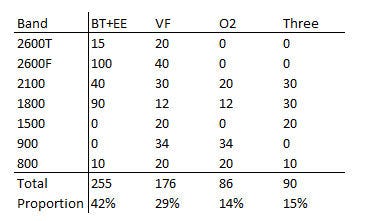The great British spectrum tug of war is finally at an end
The UK court of appeal has rejected Three’s last roll of the dice to opposed the impending 5G spectrum auction, so it’s now free to proceed.
February 14, 2018

The UK court of appeal has rejected Three’s last roll of the dice to opposed the impending 5G spectrum auction, so it’s now free to proceed.
Three has been moaning about how much mobile spectrum it doesn’t have for a year or two, and identified future auctions as an opportunity to redress the balance. But Three wanted the total ownership of UK mobile spectrum by one operator to be capped at 30% and Ofcom thought 37% was a sufficient cap, so Three took the whole thing to court in September last year. It lost its case three months later and applied to appeal, and it is this last initiative that has failed.
This marks the end of a protracted process in which nearly every protagonist has attempted to crudely mask their self-interest by claiming to act in the public interest. Three wanted to use the auction process to be given spectrum it had failed to win in open auction, EE entered the legal process to protect its dominant position and to plea for more spectrum to be released. Meanwhile Ofcom’s strategy from the moment Three announced its challenge has been to accuse Three of selfishly trying to ruin 5G for everyone by delaying the process.
“We are disappointed by the court decision but our decision to appeal was the right one,” said a Three spokesperson. “First of all this has not caused any delay to the delivery of 5G services to UK consumers which are not expected to rollout until 2019/20, according to Ofcom. But more importantly, our appeal is about competition in the UK mobile market and spectrum distribution is the single biggest factor in maintaining a competitive market.
“The court process has helped provide clarity on whether there is a genuine 37% cap and, thanks to the hearings, Ofcom is now much clearer that a 37% cap is the level they believe is appropriate to maintain competitive balance. However, that cap will not be in place until Q2 2020 but it is vital that Ofcom, as a minimum starting point, sticks to this number when additional spectrum is auctioned off.
“We still believe that a 37% cap is too high if the policy objective is to have a competitive four player market and we would like to see it set at a lower level in the future.”
“The Court of Appeal has very firmly rejected Three’s application for permission to appeal on all grounds,” said an Ofcom spokesperson. “We welcome this decision, and will now press ahead with releasing these important airwaves. This new capacity will allow mobile companies to offer more reliable reception, and to prepare for future 5G services.”
So now we can get on with it. There’s a bit of 2.3 GHz 4G spectrum available, which BTEE isn’t allowed to bid on, and then 150 MHz of 3.4 GHz 5G spectrum, of which BTEE will only be able to win a maximum of 85 MHz. The clear strategy for Three now, if it’s really serious about redressing the spectrum imbalance, is to bid aggressively and buy as much as possible. Here’s our table showing how current mobile spectrum is allocated among the UK operators.

About the Author
You May Also Like





.png?width=300&auto=webp&quality=80&disable=upscale)




.png?width=300&auto=webp&quality=80&disable=upscale)


_1.jpg?width=300&auto=webp&quality=80&disable=upscale)